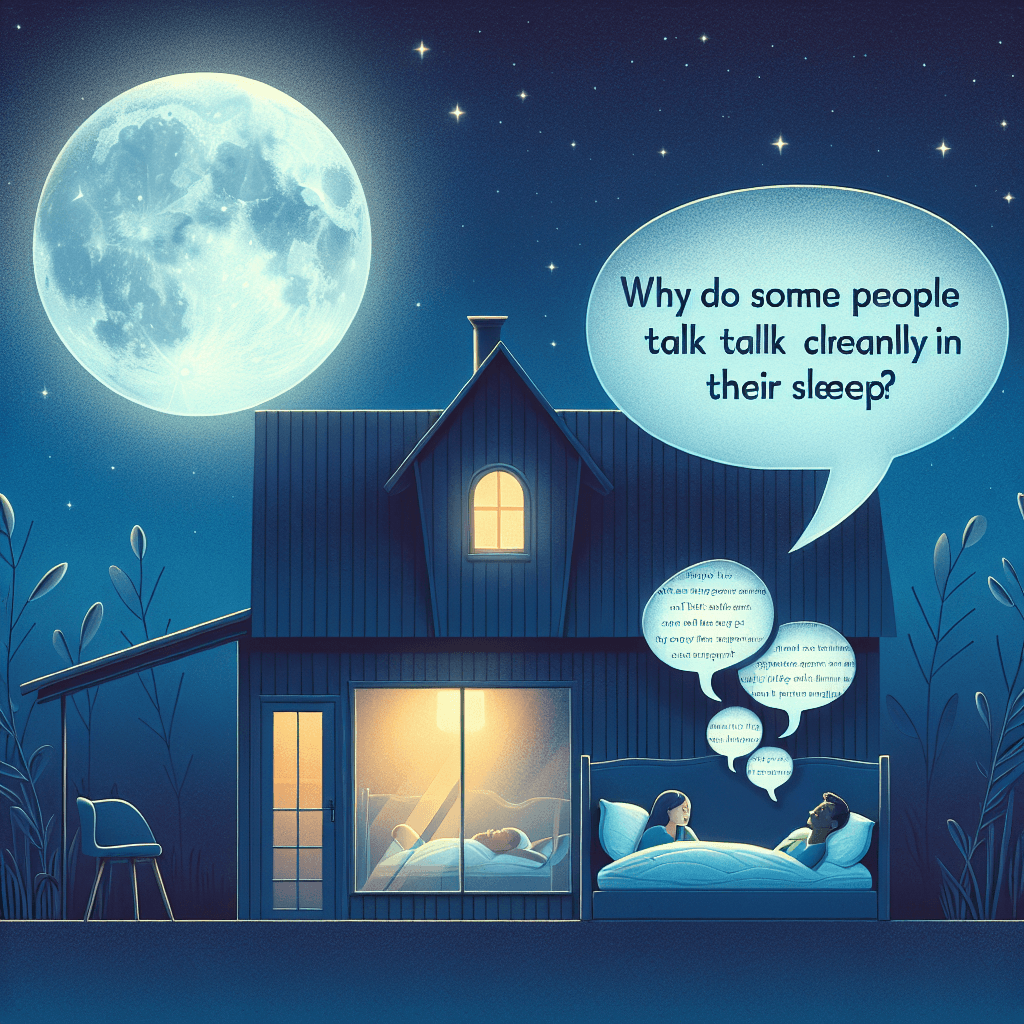Why do some people talk clearly in their sleep
Your brain paralyzes your body during sleep to prevent you from acting out dreams, so how do crystal-clear words and sentences manage to escape? Uncover the neurological mystery that allows some people to speak with startling clarity while they're completely unconscious.


Too Long; Didn't Read
TLDR: Sleep talking happens when your brain is caught between sleep stages. The part controlling speech can temporarily wake up while the part for rational thought stays asleep, allowing you to speak clearly without conscious awareness, often triggered by stress or sleep deprivation.
The Midnight Monologue: Why Do Some People Talk Clearly in Their Sleep?
Have you ever been woken by your partner delivering a surprisingly articulate speech to a pillow? Or perhaps you’ve been told that you yourself are a nighttime narrator, holding entire conversations after you’ve drifted off. This phenomenon, known as sleeptalking, is a common and often baffling human experience. While many people only manage mumbled gibberish, others can speak in full, coherent sentences. This begs the question: what's happening in the brain that allows for such clarity? This post will delve into the science of somniloquy to uncover why some people talk so clearly in their sleep, exploring the sleep stages, triggers, and the meaning behind these nocturnal narratives.
What Exactly Is Sleeptalking?
Sleeptalking, or somniloquy, is medically classified as a parasomnia—an undesirable behavior that occurs during sleep. It's incredibly common, with some estimates from the American Academy of Sleep Medicine suggesting that up to two-thirds of people will experience it at some point in their lives, though only about 5% of adults do so regularly.
These sleepy speeches can range dramatically in their content and clarity. They might be a few nonsensical words, a single emotional outburst, or a complex, multi-sentence monologue that sounds perfectly logical. Importantly, the sleeptalker is completely unaware of their vocal performance and will have no memory of it upon waking.
The Science Behind Clear Sleeptalking
The clarity of sleeptalking is not random; it is closely tied to the specific stage of sleep the person is in. Our sleep is divided into two main types: Non-Rapid Eye Movement (NREM) sleep and Rapid Eye Movement (REM) sleep.
NREM Sleep: The Mumbles and Moans
NREM sleep consists of three stages. Talk that occurs during the lighter stages (N1 and N2) might be somewhat understandable. However, if a person speaks during the deepest stage of NREM sleep (N3), it's often part of a "confusional arousal." Here, the brain is caught in a blurry transition between deep sleep and wakefulness. The resulting speech is typically more like moaning, groaning, or disjointed gibberish because the brain's higher-level cognitive functions are still mostly offline.
REM Sleep: The Stage for Clear Speeches
This is where the truly clear and elaborate sleep-talking episodes often happen. REM sleep is the stage where most of our vivid dreaming occurs. During this phase, our brain activity is remarkably similar to when we are awake. The brain's language centers can become active, processing the "script" of our dreams.
Normally, a clever biological mechanism called REM atonia paralyzes our voluntary muscles to prevent us from physically acting out these dreams. However, sometimes a "motor breakthrough" occurs. This allows the muscles controlling our vocal cords and mouth to activate, letting the words from our dream slip out into the real world. Because the brain is operating at such a high level, this speech can be complex, grammatically correct, and emotionally charged, mirroring the dream's content.
What Triggers These Nighttime Narratives?
While the potential for sleeptalking exists in all of us, certain factors can make it more likely for someone to become a nighttime chatterbox. These triggers often disrupt or intensify our sleep patterns:
- Stress and Anxiety: Emotional turmoil from the day can easily bleed into our sleep, leading to more intense dreams and a higher likelihood of vocal outbursts.
- Sleep Deprivation: When you're exhausted, your sleep can become more fragmented. The body often tries to compensate with more deep sleep and REM sleep, creating more opportunities for parasomnias to occur.
- Genetics: Like many sleep behaviors, somniloquy often runs in families. Research published in the journal Sleep has identified a potential genetic link for parasomnias.
- Fever or Illness: Being sick can disrupt normal sleep architecture, leading to unusual behaviors like sleeptalking.
- Certain Medications or Substances: Alcohol, sedatives, and some antidepressants can alter sleep cycles and increase the frequency of parasomnia episodes.
For the vast majority of people, sleeptalking—even if it’s crystal clear—is completely harmless. The content is usually random and is not a reliable source of hidden truths or secret confessions. However, if sleeptalking is sudden in onset in an older adult, violent, or is accompanied by other physical behaviors like kicking or punching, it could be a sign of a more serious condition like REM Sleep Behavior Disorder (RBD) and warrants a discussion with a doctor.
Conclusion
Sleeptalking is a fascinating window into the active, mysterious world of the sleeping mind. The ability to speak clearly while unconscious isn't a sign of a special skill, but rather the result of a specific neurological process, most often occurring during the brain's highly active REM sleep stage. It's a temporary breakdown in the wall between our dream world and our physical actions. So, the next time you overhear a midnight monologue, don't worry about uncovering deep secrets. Instead, appreciate it for what it is: a fleeting, unfiltered glimpse into the incredible and complex theater of a dreaming brain.


